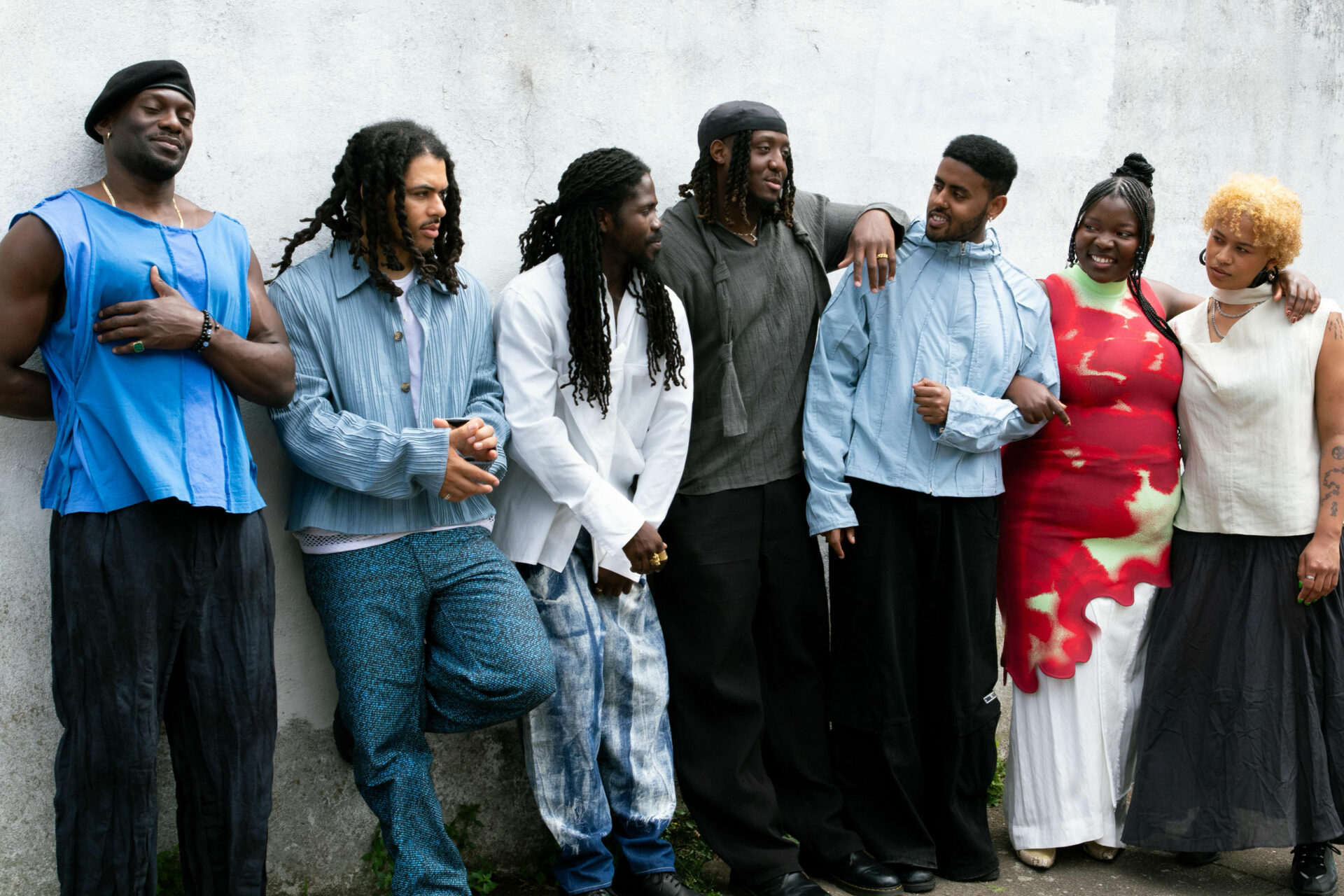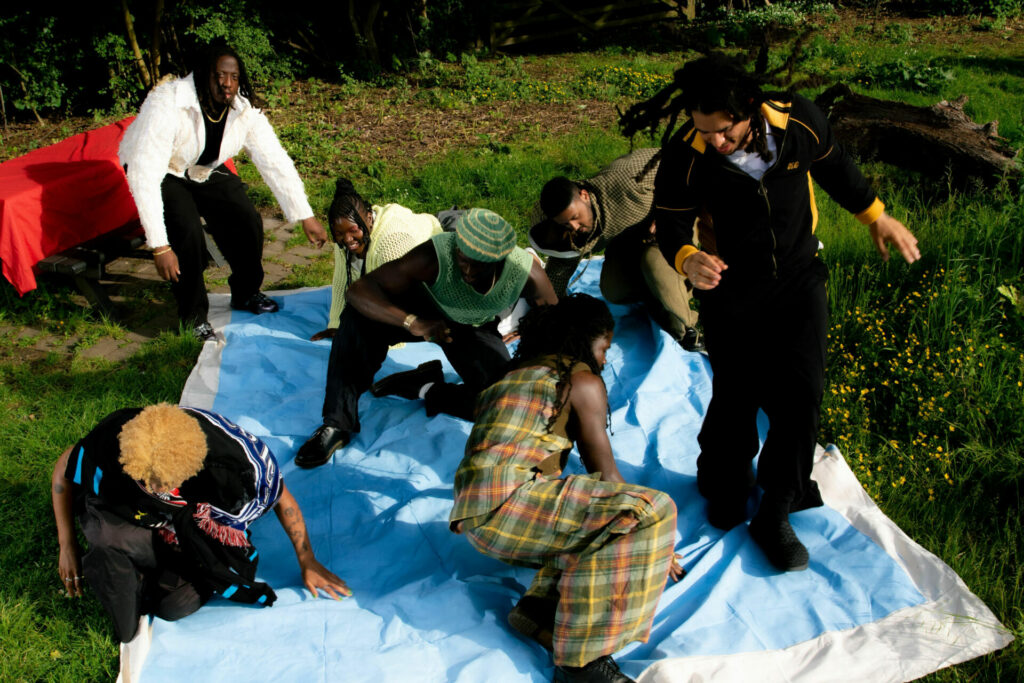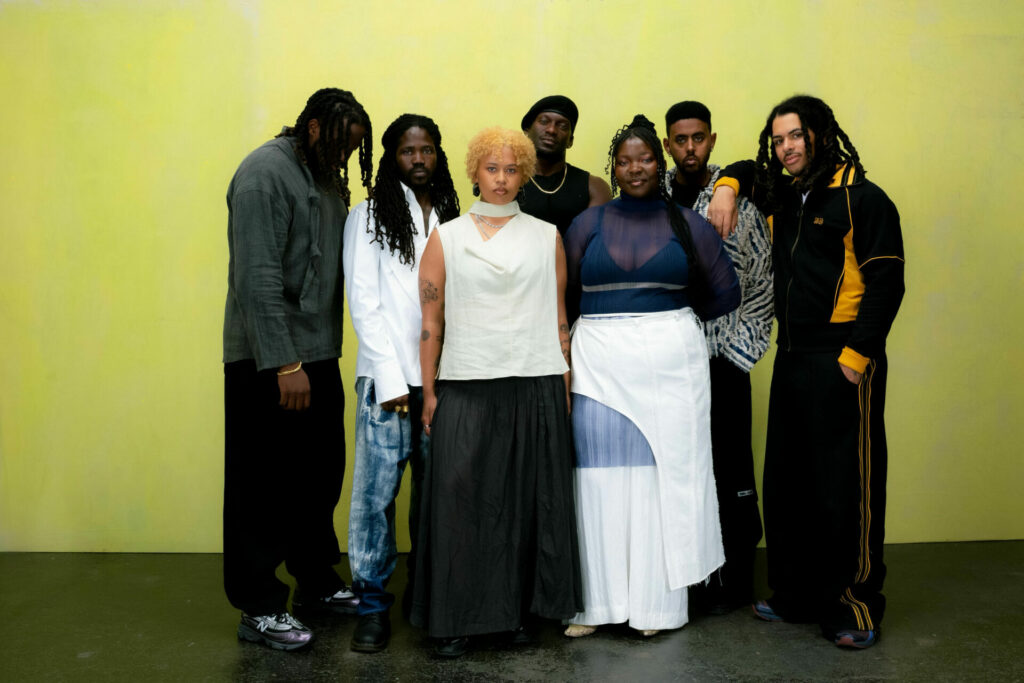Kokoroko: Rhythm of the city
Harnessing a colourful fusion of jazz, soul and afrobeat influences, Kokoroko’s second album centres on bringing their beloved London to life

Camped in a countryside studio complex amid the plush green hills and moors of south Devon, Kokoroko had no choice but to lock in. With limited phone signal, no shops within walking distance, and city distractions a distant memory, the recording location for their second album, Tuff Times Never Last, was primed for the kind of smooth, harmonious music the London collective has become renowned for.
“There’s so much peace there,” says percussionist and band co-founder Onome Edgeworth, reflecting on that time away. “It’s easier to work with other people in that environment. If you’re in London and you’re struggling to come in every day, or you feel stressed, it’s so easy for the energy to go wrong. [In Devon] it was like a sleepover vibe; you get that playfulness and lightness.”
Still, back in London, the easy, carefree dynamic between the band members remains. Joining Edgeworth to speak to Rolling Stone UK is trumpeter, vocalist and fellow co-founder Sheila Maurice-Grey, and drummer Ayo Salawu. Sat in their low-ceilinged east London studio, surrounded by an assortment of keyboards, percussive instruments and soft furnishings, the trio regularly burst into laughter, recalling memories of chaotic shows or moments in the recording process when they irritated each other. “Yohan, our keys player, drove us crazy recording ‘My Father’,” says Edgeworth with a laugh. “We were trying to sleep, and he was with [producer] Miles [James] going over three minutes of it on loop for four, five hours… I never wanted to hear that song again!”
Along with Yohan Kebede, the septet is completed by Duane Atherley (bass), Anoushka Nanguy (vocals/trombone), and Tobi Adenaike-Johnson (guitar). Assembled after Maurice-Grey and Edgeworth met on an arts trip to Kenya in 2014, the band takes its name from the Urhobo (a Nigerian tribe and language) word meaning ‘be strong’. A focus on joining the dots between different sounds from the African diaspora has always been central to their work.
Kokoroko released their eponymous debut project in 2019, a year after the inclusion of their light, meandering breakout hit ‘Abusey Junction’ (currently on 76 million Spotify streams) on Giles Peterson’s 2018 London jazz compilation We Out Here, solidifying their place within a fluid, flourishing scene in the capital.
Fusing ideas from afrobeat, West African highlife and jazz, the group’s earlier releases (including 2022 debut album Could We Be More) chimed with a mellow, swaying soulfulness, guiding you gently along a lethargic, sun-dappled, early evening walk. Their second record still centres around a summery blend of jazz, afrobeat and soul influences, but it’s a little more active; rather than ending that stroll with a nap under the shade of a palm tree, Tuff Times Never Last grips your hand tighter and leads you to the dancefloor.
“We were searching for playfulness and enjoyment,” explains Edgeworth. “How do we want it to feel when we’re out playing this music? If you’re doing 50, 60 shows a year, that’s an hour of your life for a lot of nights, so what do we wanna bring to our own lives? Rather than thinking of the dancefloor intentionally, that was the answer to that question. There’s so much going on in the world, I wanna focus on bringing joy and light to my own life and hopefully that spreads to everyone around.”

Kokoroko’s new album is packed with evidence of that mindset. Whether it’s the outrageously funky slap bass and wah-wah guitar interplay on ‘Just Can’t Wait’ or the choral refrain at the heart of ‘Sweetie’ (“Sweetie makes my heartbeat bounce”), delivered with the urgency and power of an old-school Fela Kuti hook, things are more upbeat and front-footed than ever before. Using joyful live music to escape a hostile world is something fellow London jazz scene graduates Ezra Collective have been vocal about, and Kokoroko are clearly on a parallel trajectory.
“When you create more and more albums, it allows you to express more and more of the influences within the group,” says Salawu, explaining how this direction has allowed them to highlight new parts of their identity. “There were so many areas we hadn’t gone down before this album; songs like ‘Da Duh Dah’ are a fresh addition to our sound catalogue.”
From the sharp, snappy rhythm sections of Lafayette Afro Rock Band to the experimental synth design of Nigerian trailblazer William Onyeabor, the band’s pool of sources was extensive. “We’re exploring this new sound world, and it’s been incredibly fun,” says Maurice-Grey, who notes how their 2024 EP Get the Message “bridged the gap between the first and second albums”, incorporating greater synth experimentation and funk settings and laying the groundwork for the new project. Equally, long-established inspirations remained key to the writing process.
“For a long time, Earth, Wind & Fire have been a big influence for us,” says Maurice-Grey. “Their song ‘Dreams’ was a beautiful reference we had; we were inspired by the purity and boldness they had to just write beautiful songs and put them in the middle of an album or EP.” When it comes to building the foundations for a powerful, beautiful live show — the core motive for everything Kokoroko do — trusting creative instincts, however brave, is crucial.
“When I remember shows, I remember small moments,” explains Edgeworth. “It might be one line that connects with you, or one piece of the horn line that stays in your head. Writing music towards that is key, because the first thing that comes to your head is normally the right thing. A lot of the choruses [on Tuff Times Never Last] came after we had the song and wanted to get vocals in… we leaned into that and didn’t intellectualise the process. And so far, it’s worked: when we’ve played the songs live, people have been singing back to us.”

Over the summer, they’re playing a series of festivals including We Out Here, in Wimborne, Dorset, and Rio Loco, in Toulouse, followed by dates in the States throughout August, and ultimately a massive headline concert at Brixton Academy in September. That show, viewed as a homecoming of sorts thanks to several band members’ south London roots, looms heavy over the horizon. Arriving at the end of a busy summer touring abroad, it gives Kokoroko the chance to plunge headfirst into the sunny, nostalgia-filled world of Tuff Times Never Last, which is rooted in the group’s memories of past London summers. From the lively, colourful illustrations emblazoned over the album sleeve (drawn by illustrator Luci Pina) to the silky Demae vocals that gave ‘Time and Time’ “that London feel”, according to Edgeworth, the record seeks to transport listeners to the baking concrete streets the band have been roaming since they were kids.
“When the sun’s out, London is the best city in the world,” smiles Edgeworth. “This album is very nostalgic, it carries the energy of our youth: summers in London, long hot days where loads of kids would be round my house or we’d be out riding and playing all day. A lot of the kids I grew up with, we’re not really friends anymore, they’ve gone through some hard times, and it’s been a difficult journey for all of us, but in our own ways we’ve all come out the other side. Inevitably, tough times will come, but it’s a short life, and we can find joy at the end of those times.”
This sense of solidarity with people from the past, figures who have dipped in and out of the picture, is part of a broader attempt to “directly relate to real situations or people in our lives”, according to the band’s co-founder. Often, Kokoroko’s music, with its broad array of globe-spanning stylistic influences, has often felt like a beautiful form of escapism. But Tuff Times Never Last is rooted in the realities and challenges of the current moment, and the experience of transcending them through music. Whether it’s exploring the dual stories of migration shared by the grandfathers of Edgeworth and Nigerian singer Azekel, who features on ‘Three Piece Suit’, or structuring ‘Da Du Dah’ around the simple but refreshingly vulnerable lament “I / I still want you”, the album is more heavily grounded in the band’s real lives than anything they’ve written previously.
“There’s genuine feeling behind these songs,” explains Edgeworth. “Rather than consciously trying to stay in one lane, we let go completely: every song is emotionally alive. For us as individuals, that’s what music should be.”
Taken from the August/September issue of Rolling Stone UK, out now. Subscribe to the magazine here.
